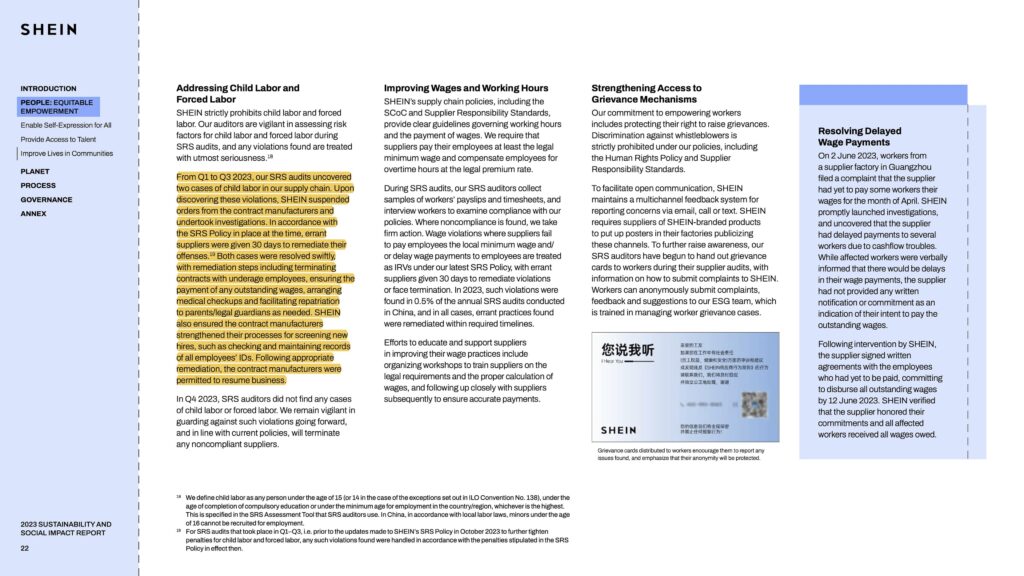Shein, the Chinese-founded fast fashion giant known for its affordable, trend-driven apparel, is pushing forward with plans for an IPO in London. This move comes despite a litany of challenges that threaten to disrupt its global operations and affect its reputation.
On October 4, the Financial Times reported that Shein’s elusive founder, Sky Xu, traveled to the UK to meet with investors. The meetings, focused on Shein’s potential listing on the London Stock Exchange, suggest the company aims for a valuation of around USD 66 billion. While the discussions did not delve into the specific mechanics of the listing, they highlighted Shein’s determination to showcase its growth potential to investors.
Shein’s decision to pursue a London IPO follows setbacks in the US. Initially aiming for a New York listing, the company shifted its focus due to political and regulatory challenges, including concerns over data security and labor practices. These issues have attracted scrutiny from US regulators and lawmakers, prompting Shein to explore alternative markets.
The company is currently awaiting approval from Chinese regulators to proceed with the overseas listing. The approval process has been slowed by China’s new data security laws, which require a thorough examination of the company’s corporate structure, adding complexity to its IPO ambitions.
Shein’s IPO efforts coincide with increasing regulatory pressure in its major markets. In the US, the Biden administration has announced plans to reform the de minimis exemption, a provision that allows imports valued under USD 800 to enter the country without customs duties or inspections. This exemption has been crucial for Shein, enabling the company to ship products quickly and cheaply to American consumers. The proposed changes aim to tighten customs enforcement to prevent tariff evasion and ensure compliance with US health, safety, and environmental standards, potentially posing significant challenges to Shein’s operations.
In the European Union, regulators are also scrutinizing Chinese imports. Authorities are considering introducing customs duties on low-value shipments from China—goods priced below the EUR 150 threshold. European officials are examining transport subsidies that benefit Chinese exporters, a practice that has helped Shein maintain its competitive pricing. If enacted, these measures could increase Shein’s costs and delay delivery times, eroding its pricing advantage in Europe.
Beyond regulatory pressures, Shein’s product safety and labor practices have come under heavy scrutiny. In August, authorities in Seoul discovered that several Shein products contained toxic substances far exceeding legal limits. Items such as shoes and accessories were found to have alarmingly high levels of phthalates and formaldehyde—chemicals linked to serious health risks, including reproductive harm and cancer. In response, Shein removed the affected items from its platforms and stated that it is working with international third-party agencies to ensure product safety moving forward.
Labor practices within Shein’s supply chain have also faced criticism. A Wired investigation in September exposed allegations of excessive working hours—up to 75-hour workweeks—alongside reports of underpayment and inadequate safety conditions in factories supplying Shein. Some workers described grueling conditions exacerbated by “labor dispatch” practices, which lack basic employment protections. Further complicating matters, Shein’s 2023 sustainability report acknowledged instances of child labor at its suppliers. The company has since suspended relationships with those suppliers and required corrective actions, but the revelations have damaged its reputation.

Shein’s environmental and ethical practices have come under fire as well. Italy’s antitrust authority launched an investigation into the company, alleging that Shein misled consumers with vague claims about its environmental sustainability efforts. Critics argue that Shein’s business model contributes significantly to environmental degradation, overconsumption, and textile waste. Meanwhile, experts have pointed out that clothing waste has doubled since 2000, with massive amounts ending up in landfills.
These accumulating pressures—regulatory scrutiny, product safety concerns, and ethical criticisms—could impact Shein’s IPO valuation and its attractiveness to investors. European institutional investors, for instance, are increasingly weighing environmental, social, and governance (ESG) factors in their investment decisions. Shein’s slow progress on these fronts may raise concerns among potential backers.
In addition to regulatory challenges, Shein faces stiff competition from other platforms such as Temu and AliExpress.
Despite these hurdles, Shein appears resolute. In response to internal and external pressures, the company has made several adjustments. Shein recently laid off 17 employees from its Singapore headquarters as part of efforts to restructure its IT R&D team. The company also announced plans to focus more heavily on localization and operational efficiency. Furthermore, according to data from London-based research firm EDITED reported by Fast Company, Shein has increased the prices of some of its core products by more than a third—a move likely aimed at bolstering revenues and showcasing profitability ahead of the tentative IPO.
Shein has repeatedly emphasized its commitment to improving practices across the board. The company asserts that it is investing in stronger governance and compliance, enhancing product safety measures, and working to ensure fair labor practices in its supply chain. Shein has highlighted collaborations with international third-party testing agencies and adherence to a strict supplier code of conduct as evidence of its commitment to improvement.
Ultimately, Shein’s path to a public listing is fraught with significant challenges that will test the company’s resilience and adaptability. Regulatory hurdles, product safety concerns, and growing ethical criticisms will need to be addressed if Shein hopes to maintain investor confidence and consumer trust. As reported by CBS News, Shein’s popularity, particularly among Generation Z consumers, may already be waning due to these mounting concerns. Experts in energy and sustainability are urging consumers to consider the broader environmental impacts of fast fashion and are advocating for more responsible purchasing behaviors.
The coming months will be pivotal for Shein as it navigates these complex challenges and moves forward with its IPO plans. Investors and consumers alike will be closely watching to see how the company responds to regulatory demands, improves transparency, and enhances its ethical and environmental practices. The outcome will likely have far-reaching implications not only for Shein but for the fast fashion industry as a whole, which is increasingly under scrutiny for its impact on society and the environment.
